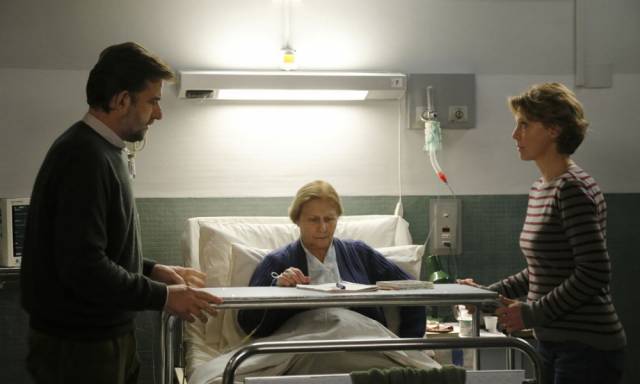
 Mia Madre attempts to tackle one of the difficult paradoxes of a death in the family: that even while one’s personal life may come crashing down, the rest of the world keeps turning. Nanni Moretti’s film tries to show this by balancing its story between the personal and professional lives of its protagonist Margherita (Margherita Buy), a longtime film director struggling with a leftist film about labor relations. Margherita hopes the film she is working on to be an important document of the working class, but her rhetoric while speaking to reporters and crew members suggests she’s losing confidence. The film is turned upside down when American star Barry Huggins (John Turturro) is flown in to play the factory’s new owner. Huggins is zealous to the point of insanity, which is tolerated when he’s professing an outsized enthusiasm for Margherita and the film but grates when he slows production by failing to learn his lines.
Mia Madre attempts to tackle one of the difficult paradoxes of a death in the family: that even while one’s personal life may come crashing down, the rest of the world keeps turning. Nanni Moretti’s film tries to show this by balancing its story between the personal and professional lives of its protagonist Margherita (Margherita Buy), a longtime film director struggling with a leftist film about labor relations. Margherita hopes the film she is working on to be an important document of the working class, but her rhetoric while speaking to reporters and crew members suggests she’s losing confidence. The film is turned upside down when American star Barry Huggins (John Turturro) is flown in to play the factory’s new owner. Huggins is zealous to the point of insanity, which is tolerated when he’s professing an outsized enthusiasm for Margherita and the film but grates when he slows production by failing to learn his lines.
Amidst this craziness, Margherita’s beloved mother Ada (Giulia Lazzarini) is reaching her end. Though she constantly visits the hospital, Margherita, whether by temperament or through the chaos of her film, seems unable to accept her mother’s imminent passing, especially compared to her brother Giovanni (Moretti), who has taken a long leave of absence to attend to his mother. Her mother’s illness causes Margherita to question all of the supposed certainties of her life, including her relationship with her own daughter, whom Ada seems to know better than she does.
Moretti doesn’t flinch from the psychic turmoil of losing a parent, showing Margherita’s doubt growing through dream sequences and astute cinematography (some shots of Margherita packing Ada’s possessions are especially haunting). But as Ada grows closer to death and that story grows more serious, the film within a film starring Turturro becomes more comically broad. Huggins is an amalgam of difficult actor tropes played with scenery-chewing abandon that is moderately entertaining on its own terms, but feels woefully out of place side by side with Ada’s death. Margherita Buy does an excellent job of linking the two storylines, showing the emotions of home and work bleeding into each other. The most positive attribute of the disparate stories is that Ada’s death juxtaposed with the self-serious film devolving into farce calls Margherita’s priorities into question when it’s too late.
Mia Madre’s disjointed nature keeps it from achieving greatness, but there’s a lot to like starting with the strong performances, namely the family members but also Turturro despite feeling airlifted in from another film. Moretti, who lost his mother during his last film, has clearly poured his own experience into this film (interestingly filtered through a female protagonist) and achieved many stirring moments, but the contrast between a hectic film set and somber deathbed may be too unique to his own life to translate widely.